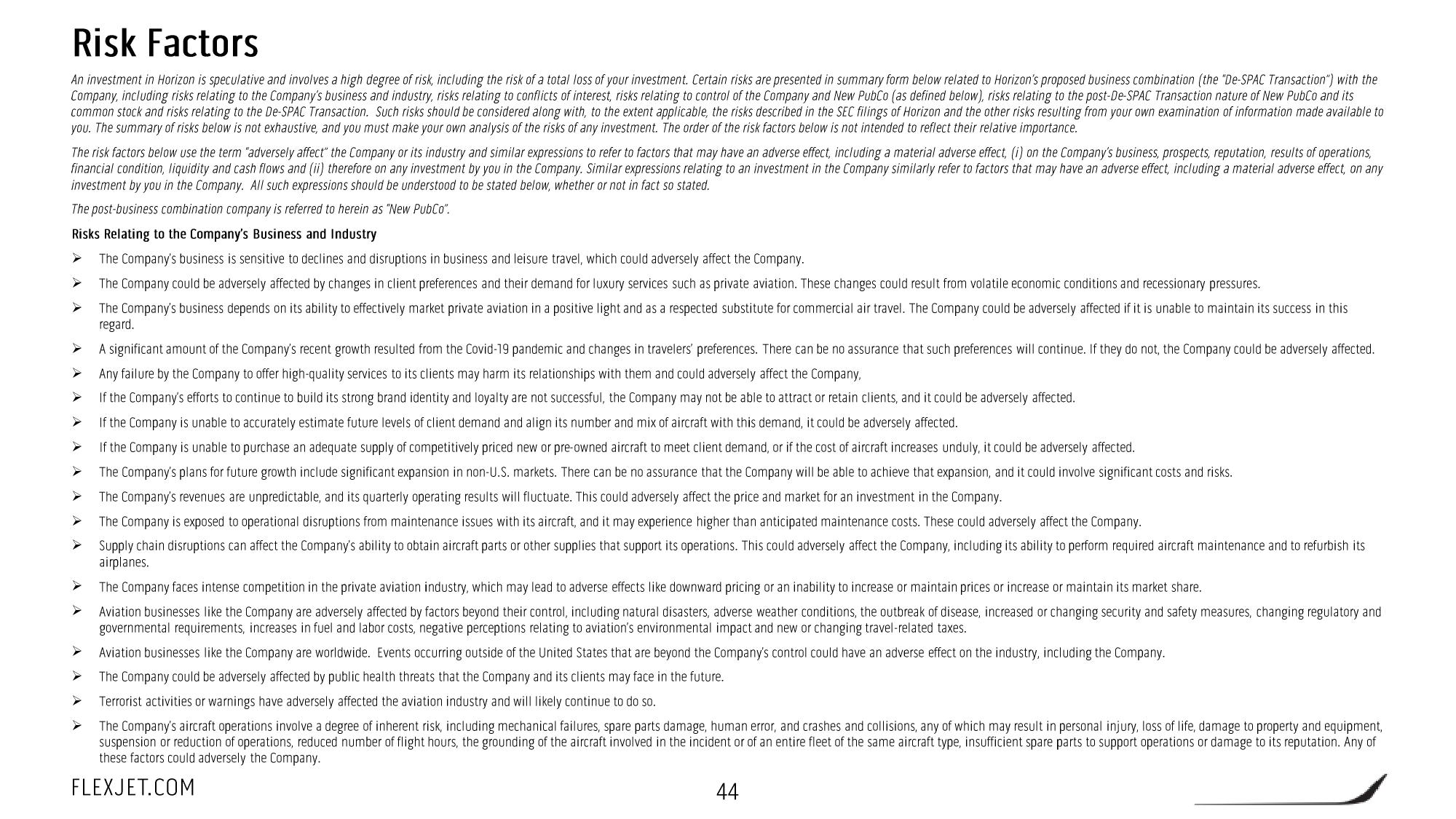FlexJet SPAC Presentation Deck
Risk Factors
An investment in Horizon is speculative and involves a high degree of risk, including the risk of a total loss of your investment. Certain risks are presented in summary form below related to Horizon's proposed business combination (the "De-SPAC Transaction") with the
Company, including risks relating to the Company's business and industry, risks relating to conflicts of interest, risks relating to control of the Company and New PubCo (as defined below), risks relating to the post-De-SPAC Transaction nature of New PubCo and its
common stock and risks relating to the De-SPAC Transaction. Such risks should be considered along with, to the extent applicable, the risks described in the SEC filings of Horizon and the other risks resulting from your own examination of information made available to
you. The summary of risks below is not exhaustive, and you must make your own analysis of the risks of any investment. The order of the risk factors below is not intended to reflect their relative importance.
The risk factors below use the term "adversely affect" the Company or its industry and similar expressions to refer to factors that may have an adverse effect, including a material adverse effect, (i) on the Company's business, prospects, reputation, results of operations,
financial condition, liquidity and cash flows and (ii) therefore on any investment by you in the Company. Similar expressions relating to an investment in the Company similarly refer to factors that may have an adverse effect, including a material adverse effect, on any
investment by you in the Company. All such expressions should be understood to be stated below, whether or not in fact so stated.
The post-business combination company is referred to herein as "New PubCo".
Risks Relating to the Company's Business and Industry
The Company's business is sensitive to declines and disruptions in business and leisure travel, which could adversely affect the Company.
The Company could be adversely affected by changes in client preferences and their demand for luxury services such as private aviation. These changes could result from volatile economic conditions and recessionary pressures.
The Company's business depends on its ability to effectively market private aviation in a positive light and as a respected substitute for commercial air travel. The Company could be adversely affected if it is unable to maintain its success in this
regard.
A significant amount of the Company's recent growth resulted from the Covid-19 pandemic and changes in travelers' preferences. There can be no assurance that such preferences will continue. If they do not, the Company could be adversely affected.
Any failure by the Company to offer high-quality services to its clients may harm its relationships with them and could adversely affect the Company,
If the Company's efforts to continue to build its strong brand identity and loyalty are not successful, the Company may not be able to attract or retain clients, and it could be adversely affected.
If the Company is unable to accurately estimate future levels of client demand and align its number and mix of aircraft with this demand, it could be adversely affected.
If the Company is unable to purchase an adequate supply of competitively priced new or pre-owned aircraft to meet client demand, or if the cost of aircraft increases unduly, it could be adversely affected.
The Company's plans for future growth include significant expansion in non-U.S. markets. There can be no assurance that the Company will be able to achieve that expansion, and it could involve significant costs and risks.
The Company's revenues are unpredictable, and its quarterly operating results will fluctuate. This could adversely affect the price and market for an investment in the Company.
The Company is exposed to operational disruptions from maintenance issues with its aircraft, and it may experience higher than anticipated maintenance costs. These could adversely affect the Company.
Supply chain disruptions can affect the Company's ability to obtain aircraft parts or other supplies that support its operations. This could adversely affect the Company, including its ability to perform required aircraft maintenance and to refurbish its
airplanes.
The Company faces intense competition in the private aviation industry, which may lead to adverse effects like downward pricing or an inability to increase or maintain prices or increase or maintain its market share.
Aviation businesses like the Company are adversely affected by factors beyond their control, including natural disasters, adverse weather conditions, the outbreak of disease, increased or changing security and safety measures, changing regulatory and
governmental requirements, increases in fuel and labor costs, negative perceptions relating to aviation's environmental impact and new or changing travel-related taxes.
Aviation businesses like the Company are worldwide. Events occurring outside of the United States that are beyond the Company's control could have an adverse effect on the industry, including the Company.
The Company could be adversely affected by public health threats that the Company and its clients may face in the future.
Terrorist activities or warnings have adversely affected the aviation industry and will likely continue to do so.
The Company's aircraft operations involve a degree of inherent risk, including mechanical failures, spare parts damage, human error, and crashes and collisions, any of which may result in personal injury, loss of life, damage to property and equipment,
suspension or reduction of operations, reduced number of flight hours, the grounding of the aircraft involved in the incident or of an entire fleet of the same aircraft type, insufficient spare parts to support operations or damage to its reputation. Any of
these factors could adversely the Company.
FLEXJET.COM
44View entire presentation